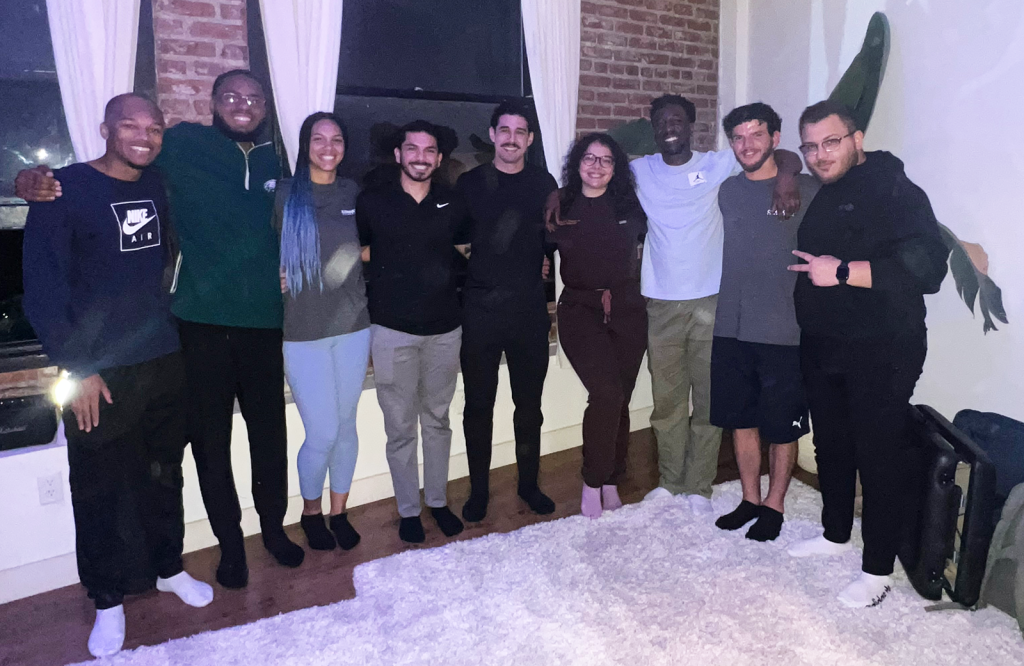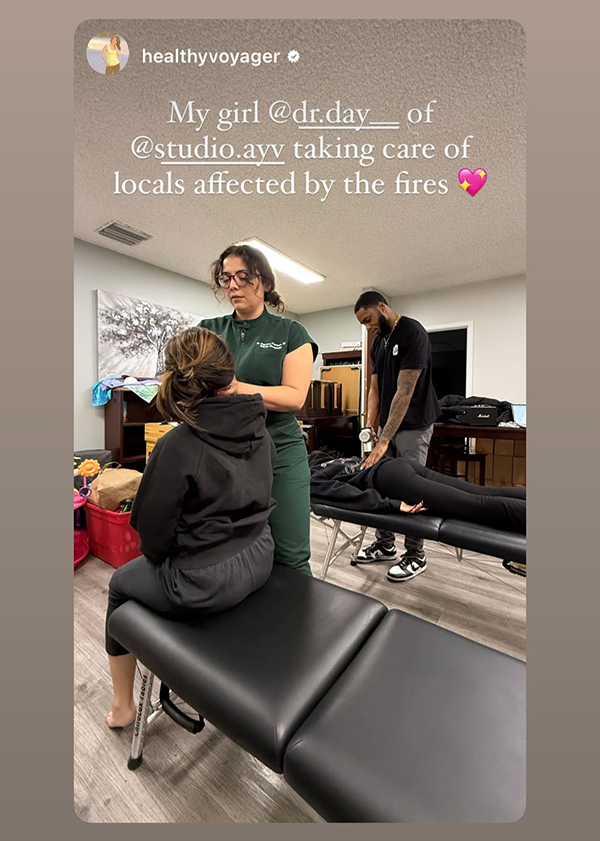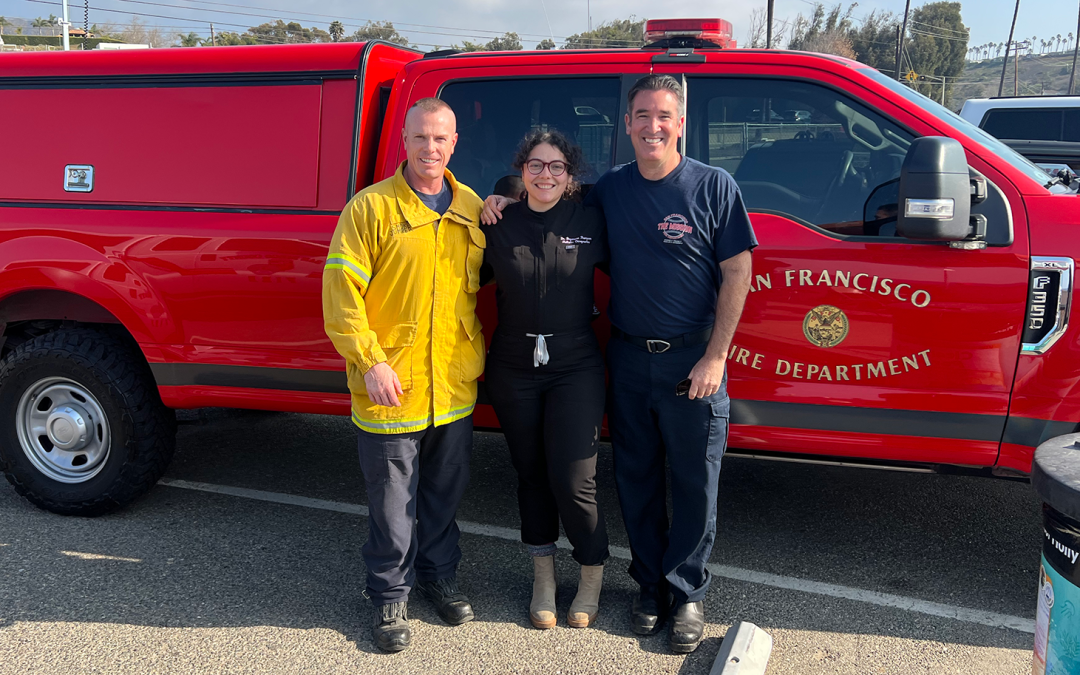By CalChiro Member Dr. Dayanara (Day) Thompson, DC
I used to be a first responder, a role that not only defined my career aspirations but also led me to chiropractic care after a life-changing accident left me unable to use my left leg. My dream had always been to become a San Francisco firefighter, and the experience of serving others during crises was deeply ingrained in me from an early age.
When I was 18 years old, my house burned down.
It was an experience that profoundly shaped my empathy and understanding for those who endure such losses. Living in an evacuation zone, I was one of the lucky ones who was able to return home, but the memory of that event stayed with me, influencing how I approach both my personal and professional life.
It gave me a heightened sensitivity to the struggles of others and a deeper appreciation for the resilience of the human spirit.
On Wednesday night, January 8, 2020, a fire broke out in Studio City near Ventura and Whitsett, across from where my clinic is located.
Watching the flames unfold on the news—and then in person—was gut-wrenching.
For four intense hours, I received countless calls and messages as I rushed to pack up my valuables and my dogs and evacuate. By the morning, I was in Compton, waking up at my family’s house at 6 a.m. to find the evacuation order lifted for my area. Returning home, I was overwhelmed with gratitude and relief. In that moment, I knew God was using me to help those around me.
As a former first responder, I understood how critical it was to support the nervous systems of the firefighters and emergency workers facing the chaos. My heart broke for those who lost everything. When my own home burned down, it was one of the most challenging periods of my life. I had just started at CSUEB as a physiology major, and the thought of losing not just my home but an entire community was incomprehensible.
Motivated to help, I rallied friends and posted on my school’s Life Chiropractic College West (LCCW) forum.
Several doctors and students volunteered to assist. Together, we served at WalkGood LA, a nonprofit focused on Black wellness in Los Angeles. With myself, seven doctors, and three chiropractic students, including Drs. Katara Sharp, Zach Soufl, Offy Kalu, Mario Pudlio, Chris Tosh, and Seth Garza, as well as students Dave Awolowo, George Zak, and Donovan Burrell, we adjusted over 75 people in one day. Many were displaced individuals and volunteers who had been tirelessly assisting others. For many, it was their first chiropractic adjustment.

From left to right: Soon-to-be DC Donovan, Dave Awolowo, Dr. Katara Sharp (LCCW Alumni), Dr. Seth Garza (LCCW), Dr. Mario Pulido, Dr. Dayanara Thompson, Dr. Offy Kalu, Dr. Zach Soulf, and soon-to-be DC George Zak.
From there, I partnered with nonprofits like CityEats, which I worked with for nearly 10 years, and Music for a Change, which created a resource and donation center for evacuees and those displaced. These experiences profoundly impacted me. Witnessing people who had lost everything express gratitude simply for being alive and in good health moved me to tears.
We also established a space at the Pasadena church, which we’ve had since January 11; Dr. Kat Anderson and my mentee, Dave Awolowo, assisted with patient care and check-in. Amidst juggling patient loads, making endless phone calls, and organizing volunteers, I finally made it to the Malibu firebase on Saturday, January 18, 2020.
There, I met Dr. Fil Troy, DC, who had been serving daily and had already provided over 500 adjustments to first responders.
My time on base was deeply nostalgic, reminding me of my three years working in an ambulance.
I connected with so many firefighters, performing 50 adjustments in just two half days. Many of them had been sleeping in their rigs and were on their 11th straight day of work. Firefighters had traveled from all over California, Colorado, Montana, Wyoming, and even Mexico and South Africa to help. There were also incarcerated firefighters serving both on the fire lines and on base, helping with food preparation.
Nighttime temperatures in Malibu dropped to 37 degrees that weekend, and while some responders were relieved to sleep in a hotel for a night, others continued resting in tents or their rigs.
There was plenty of food and LMNT electrolyte packets to sustain the crews, but the toll on their bodies was immense. These were some of the most challenging adjustments I’ve ever performed. Many had severe tension in their thoracic spines—like bricks locked in a sympathetic response.
While that state is necessary for their work, it underscored the critical need to help them shift into a parasympathetic state to recover after their shifts.

This experience taught me so much about resilience, the human spirit, and the importance of recovery—not just for individuals but for communities.
It also inspired me to push for systemic changes in how chiropractors can support first responders.
For example, we could create programs for chiropractors to be deployed during crisis situations in collaboration with the government or establish designated chiropractors for firehouses.
Being able to serve during this time was a profound honor. It reminded me of the potential we have as chiropractors to impact lives in meaningful ways. Let’s continue bridging gaps in healthcare and restoring chiropractic to the forefront of American health, as it was before the medical model’s dominance.
Together, we can be the shift that helps people heal and thrive.


